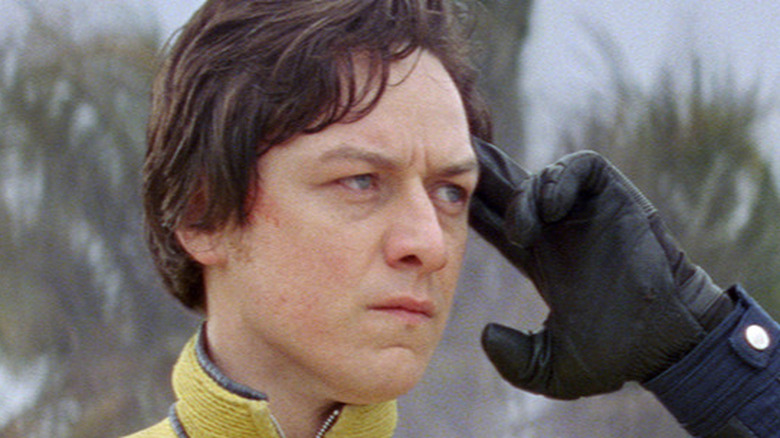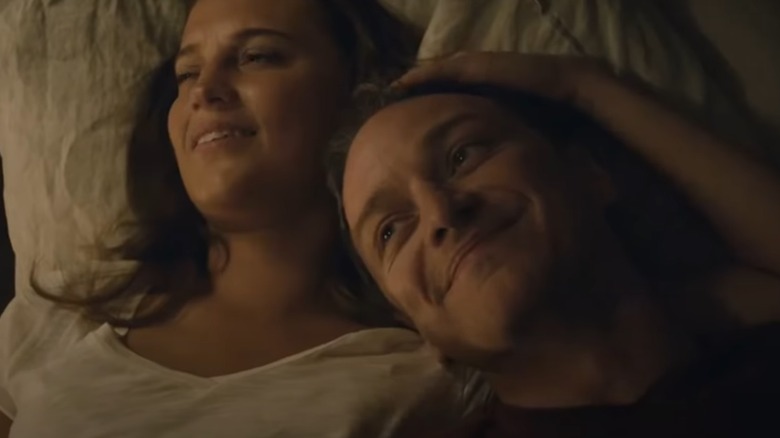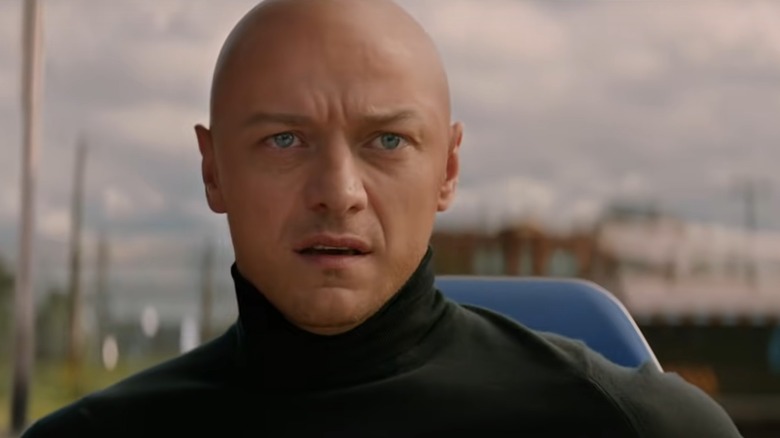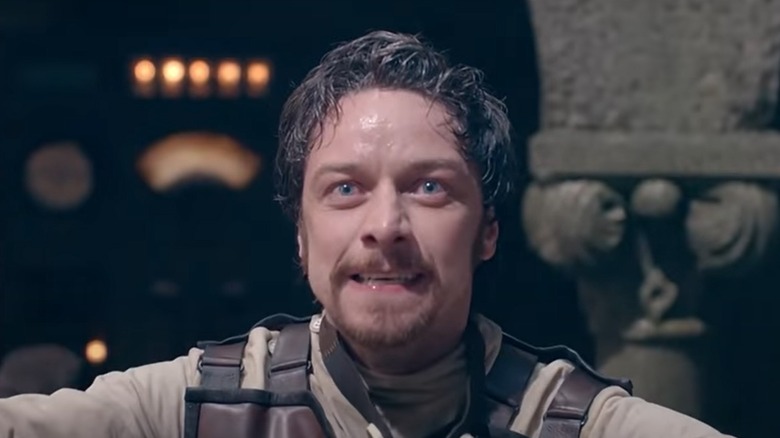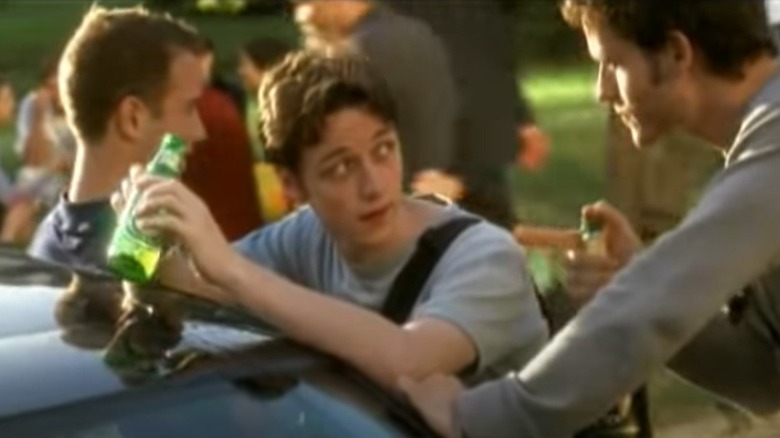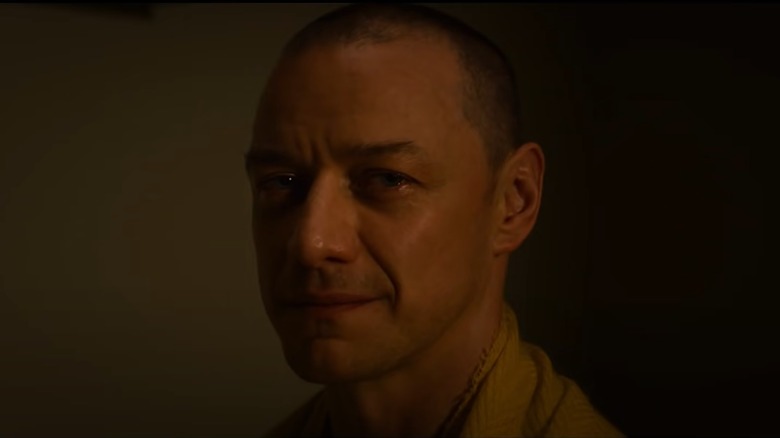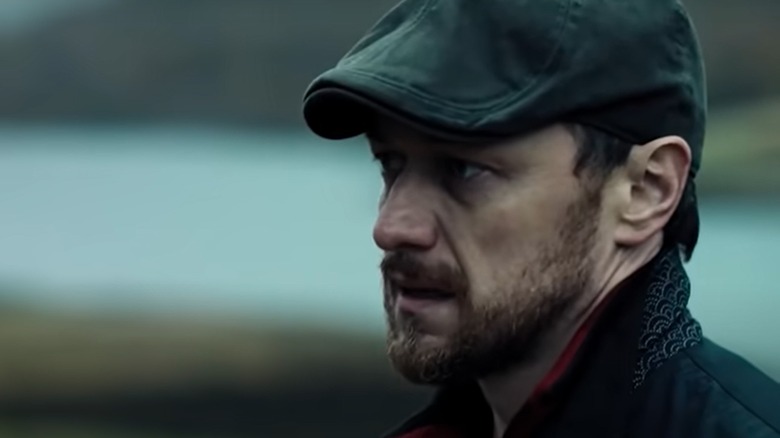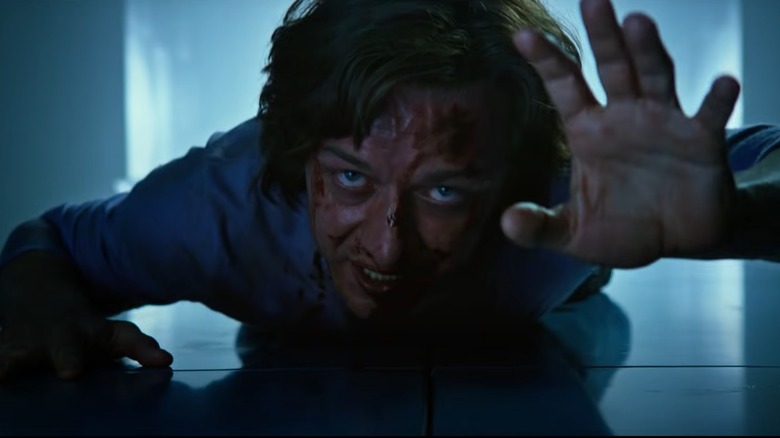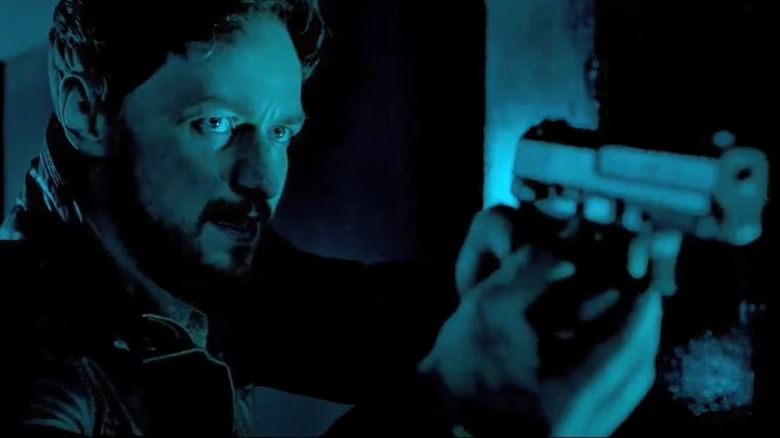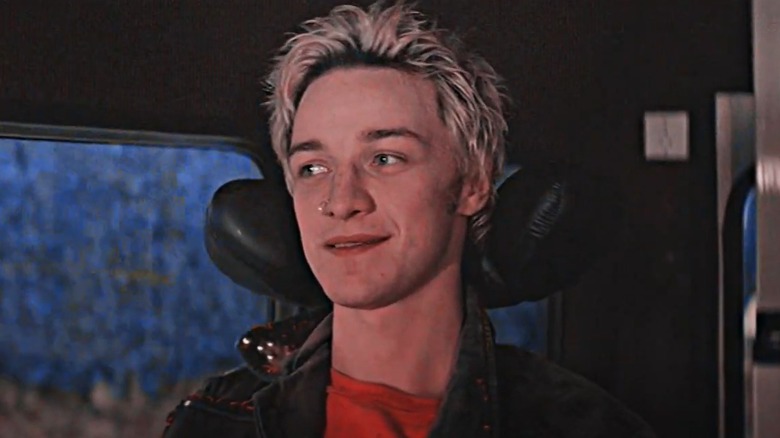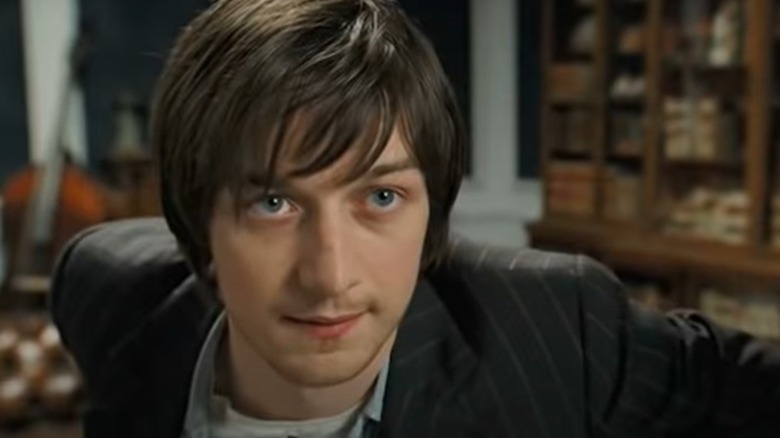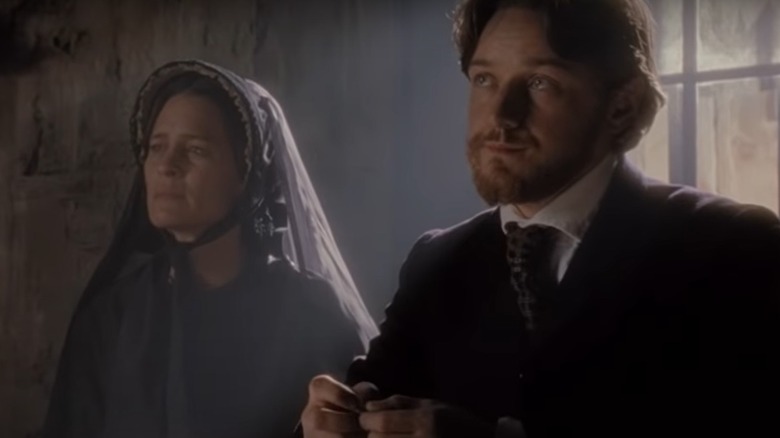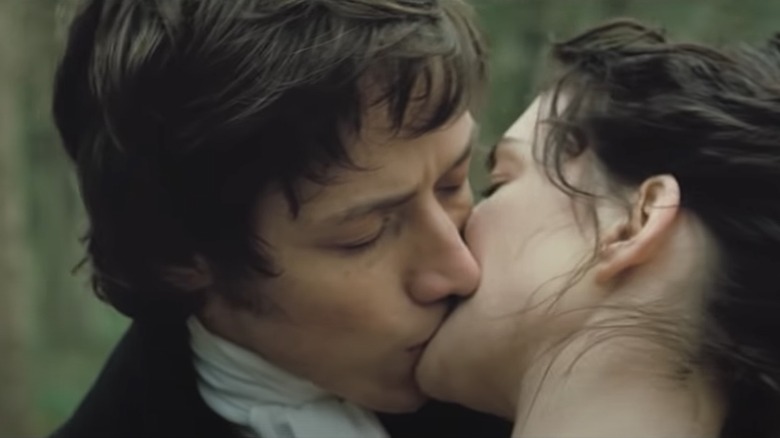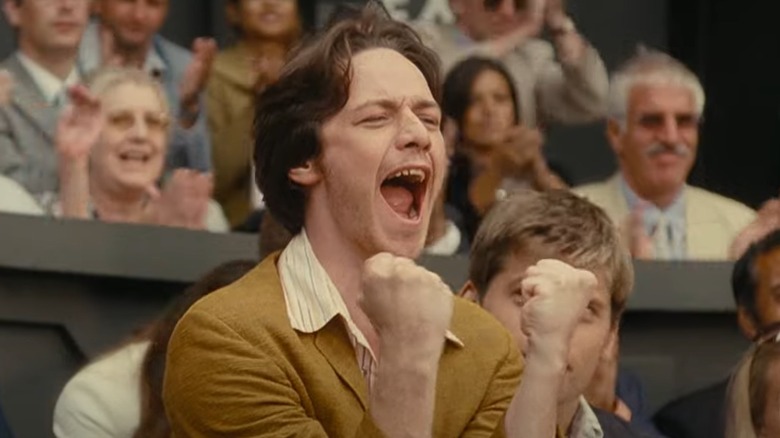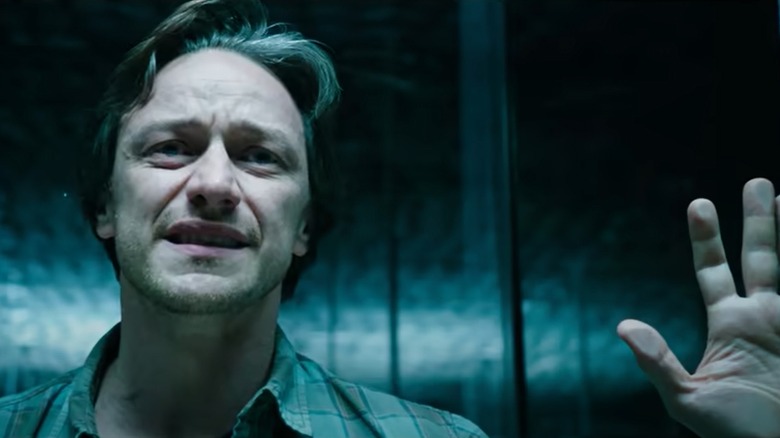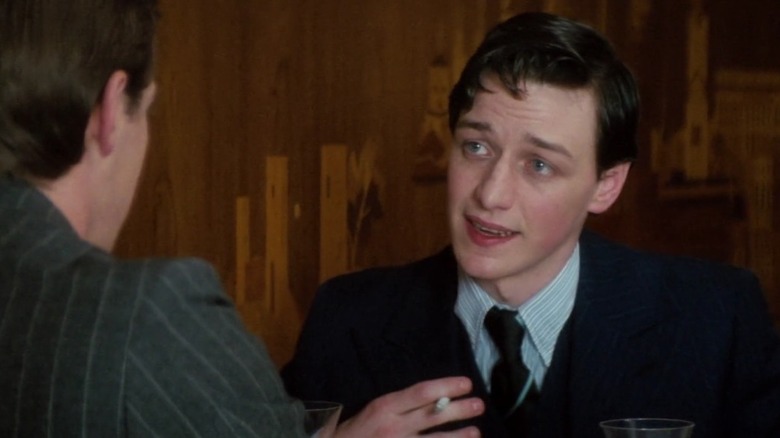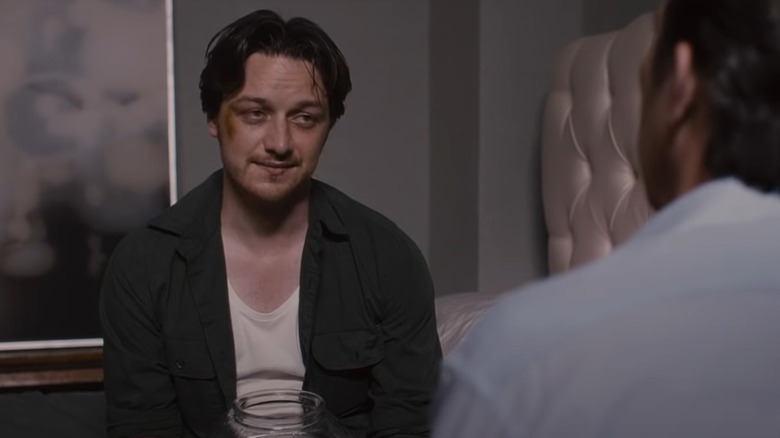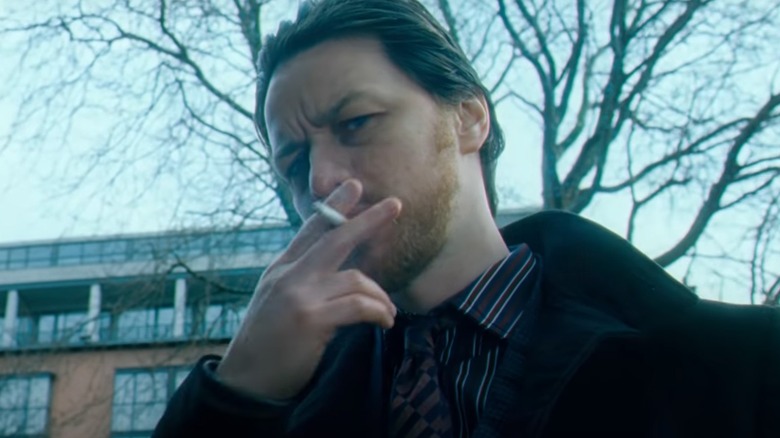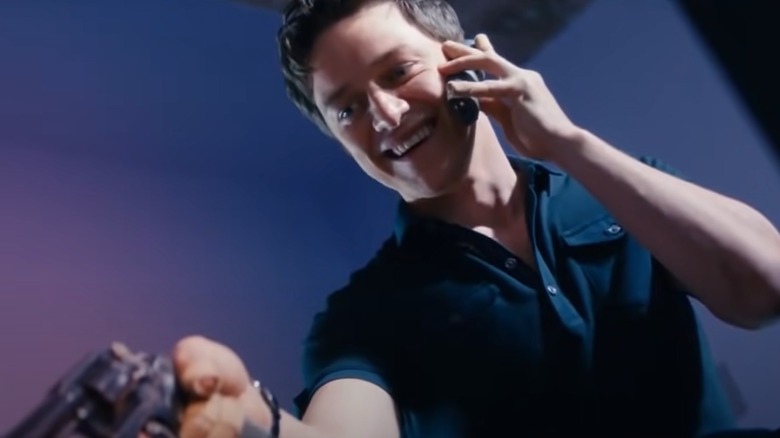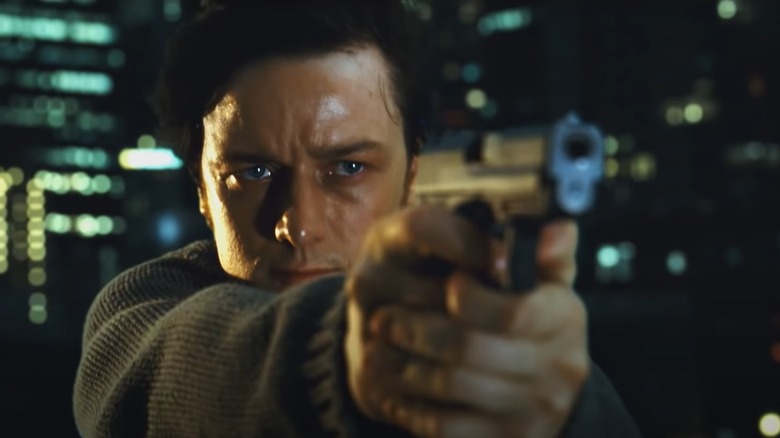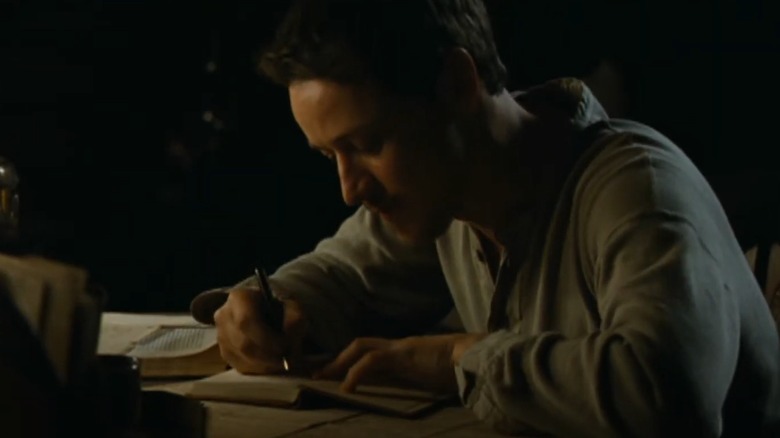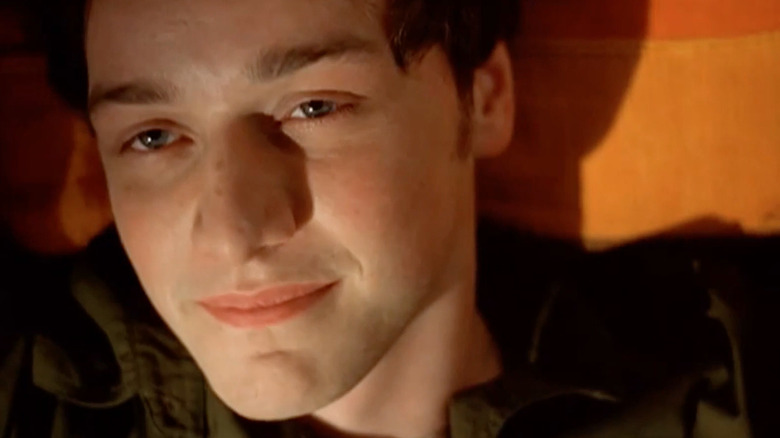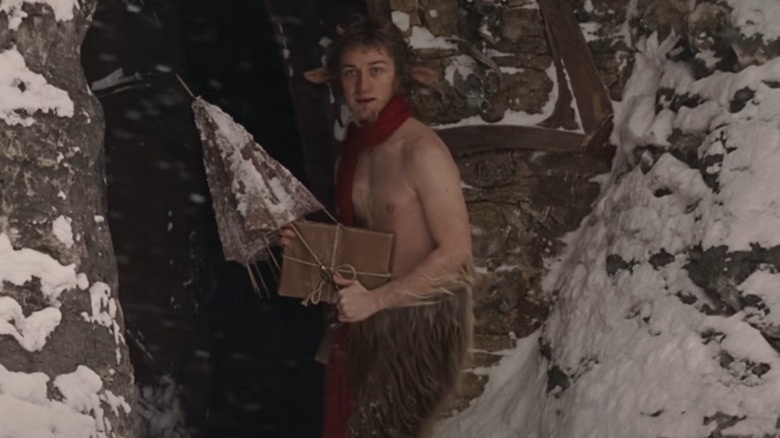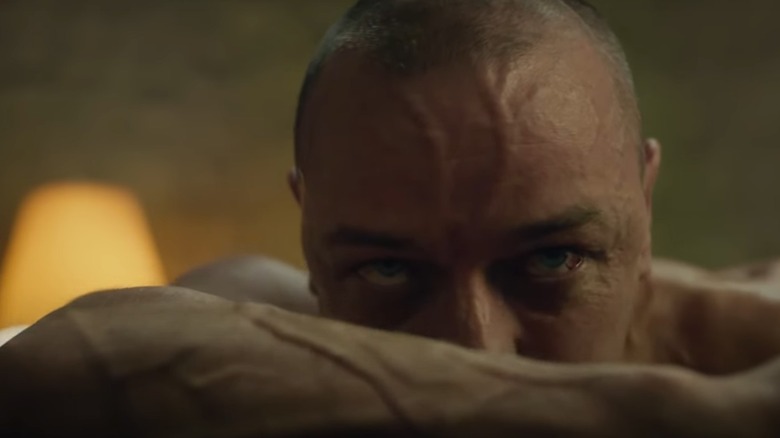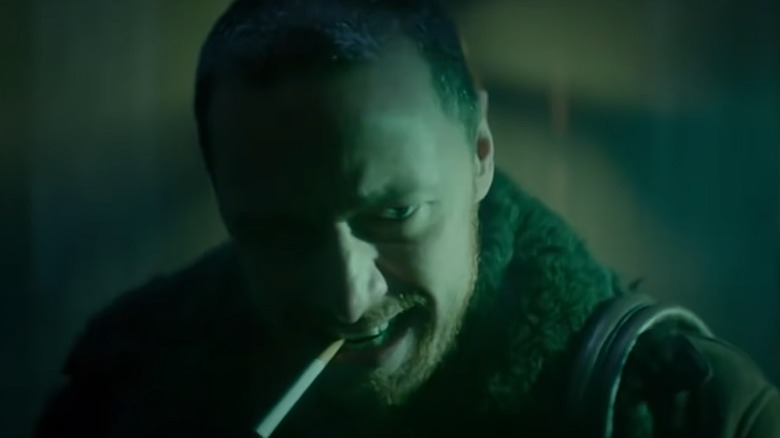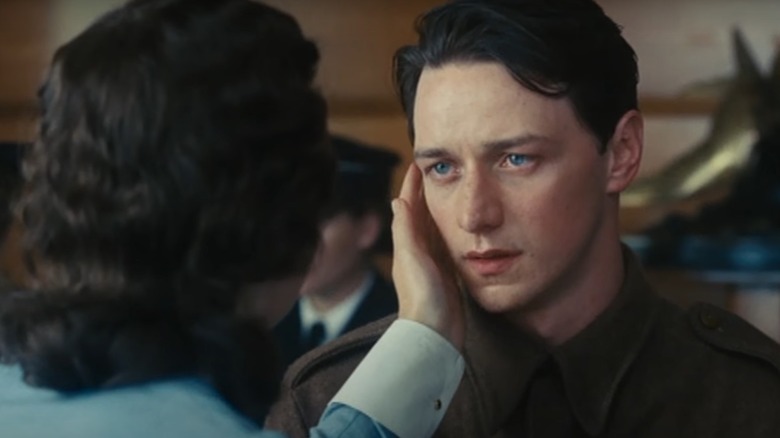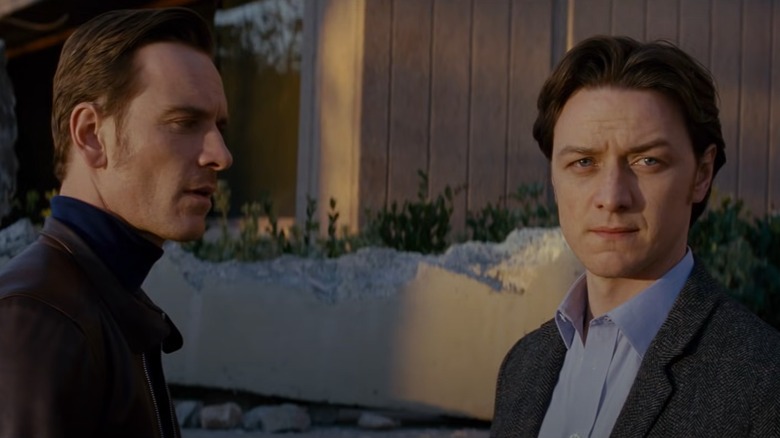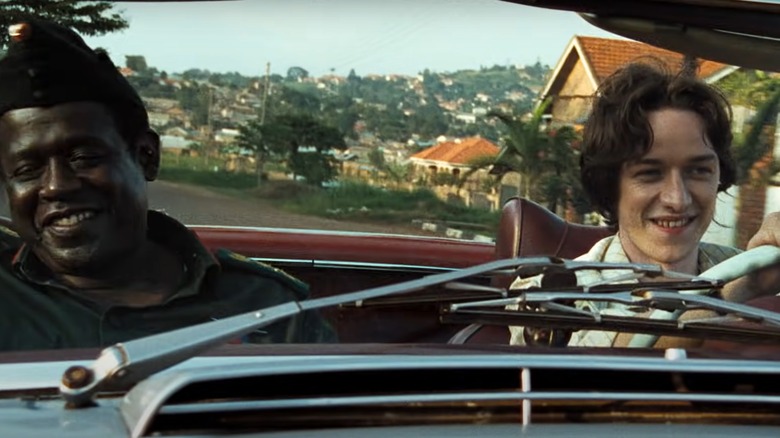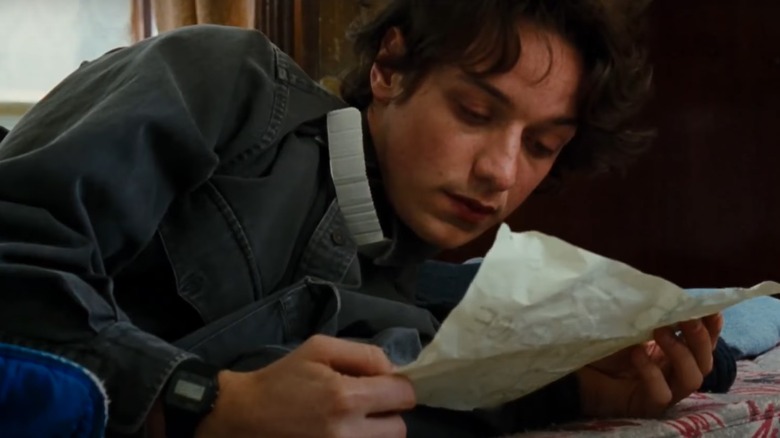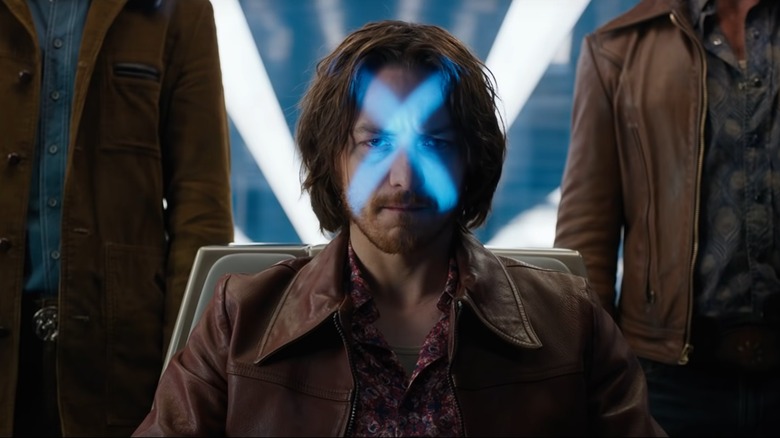Every James McAvoy Movie Ranked From Worst To Best
Scottish-born actor James McAvoy is one of the most versatile and magnetic actors on the stage and screen. A glance at his filmography reveals that no two James McAvoy films are exactly alike: he has played a faun, a mutant, an assassin, and even the man who stole Jane Austen's heart.
With a career spanning over 20 years, McAvoy brings the same intensity to a comic book movie as an experimental indie drama. Like many successful actors, McAvoy has appeared in his share of blockbusters and busts—a prestigious historical romance here, a cheap slasher flick there—but he has never delivered a subpar performance and is always extremely watchable. As we revisit nearly 30 of his major live-action roles, let's look at the hits, misses, and hidden gems in this Golden Globe-nominated performer's varied career. With help from Rotten Tomatoes, we're counting down to James McAvoy's films from worst to best.
29. Submergence
German filmmaker Wim Wenders is known for classic arthouse films such as "Buena Vista Social Club" and "Wings of Desire." It is a shame that his 2017 romantic thriller "Submergence" sinks like a stone to the very bottom of this list. James McAvoy stars as James, an MI6 agent who falls for bio-mathematician Danielle (Alicia Vikander) at a scenic French hotel. Fate soon separates them, and Danielle explores the ocean in a deep-sea submersible while James is captured in Somalia by terrorists.
"Submergence" is handsomely shot but overly long, and it essentially becomes two different films once the lovers leave the hotel. Unfortunately, neither story is interesting: James stares at the walls of his cell, Danielle stares at her phone, rinse and repeat. Director Wim Wenders also takes the title "Submergence" literally, plunging the leads into different bodies of water at every opportunity. Ultimately, the lack of chemistry (and good dialogue) between McAvoy and Vikander dooms the film. Their short tryst isn't believable as the kind of epic love story that can survive torture or a near-death experience at the bottom of the ocean. Despite "sterling" performances from both leads, "Submergence" is one cold fish.
28. Dark Phoenix
Readers may be surprised that "Dark Phoenix," the biggest box office bomb of 2019, didn't take the "Worst" spot on this list, but it was close. The final entry in 20th Century Fox's mainline "X-Men" film franchise, "Dark Phoenix" was the second attempt at adapting the beloved "Dark Phoenix Saga" comic storyline after the disastrous reception of "X-Men: The Last Stand" in 2006. Following the timeline reset in "X-Men: Days of Future Past," the X-Men engage in a space rescue mission only for Jean Grey (Sophie Turner) to bond with the cosmic Phoenix Force. Back on Earth, Jean's new powers overwhelm her, and she accidentally kills her teammate Mystique. As Professor X (James McAvoy) and Magneto (Michael Fassbender) fight over Jean's fate, mysterious alien invaders plot to take the power of the Dark Phoenix for themselves.
"X-Men" producer and first-time director Simon Kinberg originally intended "Dark Phoenix" to be a two-part epic. Rewrites resulted in a film that was more grounded and unambitious than the space opera X-Men fans expected. Combine that with weak villains and a checked-out cast, and the viewers are left with a film running on fumes. Despite an uplifting epilogue where McAvoy and Fassbender's Xavier and Magneto reunite and settle their differences with a game of chess, "Dark Phoenix" is the last gasp of a once-mighty franchise.
27. Victor Frankenstein
"You know this story," says Igor (Daniel Radcliffe) at the beginning of 2015's "Victor Frankenstein." So why tell it again? Borrowing characters, visuals, and plot elements from previous "Frankenstein" adaptations (especially Universal's 1931 classic film), "Victor Frankenstein" should have been left on the slab. The only meaningful change is who is telling the story this time: Igor, Victor Frankenstein's hunchback assistant.
When Frankenstein (James McAvoy) meets Igor for the first time, he is performing in a circus as both a clown and an amateur doctor. They work together saving the life of an injured aerialist, and Igor becomes a valued partner to Frankenstein—and a witness to his dangerous tampering with the forces of life and death. "Victor Frankenstein" embraces the latent homoeroticism in the concept of two men trying to create a new life, and it gives the cast plenty of pulpy scenery to chew. But what kind of "Frankenstein" movie introduces the monster only in the last 15 minutes? Despite McAvoy's ferocious, frothing performance, "Victor Frankenstein" is dead on arrival.
26. The Pool
James McAvoy is no stranger to the horror genre, having starred in "Victor Frankenstein," "Split," and "It Chapter Two." But his first brush with the dark side of cinema was 2001's "The Pool." One of the countless slasher movies following in the wake of "Scream," this unimaginative flick is notable only for featuring future stars McAvoy and Isla Fisher as two teenagers who meet the wrong end of a machete.
Set in Prague, "The Pool" follows a group of international students eager to make one last splash before graduation. The teenagers break into an indoor water park but are soon attacked by an unknown killer wearing a skull mask. "The Pool" is a by-the-numbers slasher—no one will be surprised by the characters who split away from the group so they can die quicker, or the killer's deeply misogynistic motivation. When the Final Girl tells her boyfriend, "I know what you did last summer," you know "The Pool" has nothing original to say.
25. Glass
M. Night Shyamalan's "Unbreakable" (2000), starring Bruce Willis as a man who displays superpowers after surviving a train crash, developed a cult following for its original take on the superhero formula. Sixteen years later, fans were excited when the ending to Shyamalan's "Split" revealed it was a stealth sequel to "Unbreakable" via an uncredited cameo from Willis. Shyamalan completed his trilogy with 2019's "Glass," bringing his protagonists—The Overseer (Willis), The Horde (James McAvoy), and Mr. Glass (Samuel L. Jackson)—together for the first time in a psychiatric hospital.
In the 19 years between "Unbreakable" and "Glass," superhero narratives have gone from nerdy niche to blockbuster fodder. Shyamalan subverts the genre in "Glass," making a superhero film that feels deliberately underwhelming, even alienating, to its audience. Instead of a grandstanding, world-saving finale, all three leads are killed, with the most ignoble death going to Willis, who drowns in a puddle. Whatever statement the film was trying to make about superheroes is ultimately pointless. As David Ehrlich said in his IndieWire review, "The trouble with 'Glass' is that its mildly intriguing meta-textual narrative is so much richer and more compelling than the asinine story that Shyamalan tells on its surface." Although many—including Shyamalan—were impressed with McAvoy's performance, that alone couldn't rescue the film.
24. My Son
"My Son" gives James McAvoy one of the most challenging roles of his career as a father investigating the disappearance of his young son. The twist of this 2021 mystery thriller isn't found in the plot, but rather in the lead performance. James McAvoy was the only actor on the "My Son" set not given a script or a word of dialogue, creating a unique cinematic experience where the audience uncovers clues and deciphers the mystery at the same time the actor does. The extent of McAvoy's improvisation is impressive, considering that "My Son" contains a scene where he tortures a suspect with a blowtorch.
Christian Carion adapted "My Son" from his 2017 French film "Mon garçon," which would give one hope that he had ironed out the kinks in such an unusual production. But the film doesn't have much to offer audiences aside from the central gimmick. McAvoy gives a naturalistic performance, capturing a father's confusion, anxiety, and rage, while buoyed by Claire Foy's sturdy portrayal of his ex-wife. The fatal flaw is the mystery itself, which needs to be straightforward enough for McAvoy to reach its planned conclusion and turns the film into yet another "familial revenge" story. "My Son" could have been groundbreaking, but it's only conventional.
23. X-Men: Apocalypse
The '80s were not gnarly for the mutant superheroes in "X-Men: Apocalypse" (2016). Actually, they were pretty heinous. Bryan Singer's final film for the franchise he launched with 2000's "X-Men," "X-Men: Apocalypse," is a dizzying dive from the heights of "X-Men: Days of Future Past" (2014).
It's the early 1980s, and Professor X (James McAvoy) dresses like he's on "Miami Vice" as he instructs a new class of super students, including telepath Jean Grey (Sophie Turner) and Cyclops (Tye Sheridan), who wears his sunglasses at night and during the day, too. Meanwhile, the ancient mutant En Sabah Nur (Oscar Isaac, unrecognizable under pounds of blue makeup) seeks to rule the world with his Four Horsemen of the Apocalypse.
"X-Men: Apocalypse" has its charms—Evan Peters' Quicksilver returns for another breathless rescue scene, set to Eurythmics' 1983 classic "Sweet Dreams (Are Made of This)"—but it is uneven and overstuffed. Even diehard X-Men fans will groan at the film's many detours, including the obligatory Wolverine cameo. Somehow, Holocaust survivor Magneto (Michael Fassbender) destroying Auschwitz out of grief and rage is in the same movie with Nightcrawler (Kodi Smit-McPhee) wearing Michael Jackson's "Thriller" jacket. They may save the world, but for the X-Men, this film is a sign of the end times.
22. Welcome to the Punch
"Welcome to the Punch" (2013) is a standard shoot 'em up starring James McAvoy and Mark Strong as two men on different sides of the law. McAvoy is DI Max Lewinsky, a cop still dealing with the effects of being shot by career criminal Jacob Sternwood (Strong) eight years earlier. Fate makes the men reluctant allies when an arms dealer (Johnny Harris) is revealed to be collaborating with Lewinsky's superior officer (David Morrissey). Several shootouts follow, all leading to a final confrontation at the container yard known as "the Punch." Get the title now?
McAvoy and Strong are excellent foils to one another, but their sparks don't light up what is ultimately a derivative cops and robbers movie. It's a shame, because one wonders what the two leads could have done with a more interesting script that expanded their roles beyond "hero cop" and "noble villain." "Welcome to the Punch" is a decent time-waster for action-junkies, but not much else.
21. Inside I'm Dancing
Also released under the title "Rory O'Shea Was Here," the Irish comedy-drama "Inside I'm Dancing" (2004) stars McAvoy as the titular Rory O'Shea, an irrepressible rebel with bleach-blond spikes and a nose ring who lives with Duchenne muscular dystrophy. He befriends the introverted Michael (Steven Robertson), who has cerebral palsy and lives in the same residential house for the disabled. Encouraging him to live more independently, Rory helps Michael move into a new apartment, and they hire a caregiver, the pretty Siobhán (McAvoy's future "Atonement" co-star, Romola Garai). But this being a certain kind of "inspirational" film, tragedy inevitably strikes.
Eighteen years after its release, "Inside I'm Dancing" deserves scrutiny for casting two able-bodied actors as the disabled, wheelchair-using Rory and Michael. As Andrew Pulrang, a disabled writer, said of the issue in Forbes, "What to some viewers seemed to be deeply empathetic and almost athletic feats of acting, to others...in particular many actual disabled people...seem more like showboating and mockery." The film attempts to address ableism in Ireland, including the difficulty of finding affordable, accessible housing, but "Inside I'm Dancing" undermines its message with problematic casting and a sentimental, sappy story that relies on stereotypes.
20. Penelope
Christina Ricci plays the titular heroine of "Penelope," a young woman born with a pig snout as the result of a witch's curse upon her wealthy family. With the clue that "only one of her kind" can break the curse, Penelope's family believes that a rich suitor will fix her. But Penelope, snout hidden under a colorful scarf, falls for Johnny Marsh (James McAvoy), a man whose blood runs red instead of blue.
"Penelope" (2006) is an eccentric fairy tale that helped cement McAvoy's status as a romantic lead. Viewers watching today will be star-struck by the supporting cast, which includes Catherine O'Hara and Richard E. Grant as Penelope's parents, Reese Witherspoon as her new friend Annie, and Peter Dinklage as a tabloid reporter sourly named Lemon. The actors gamely play along with the film's quirky plot and uplifting final message about self-confidence, but there may be a limit to how many pig jokes they can take.
19. The Conspirator
"One bullet killed our beloved president. One bullet, but not one man!" says Chief Prosecutor Joseph Holt (Danny Huston) in a dramatic courtroom scene from "The Conspirator" (2010). Robert Redford's period drama explores a little-known chapter of American history: the trial of Mary Surratt (Robin Wright) in the aftermath of Abraham Lincoln's assassination. Mary's son John was one of the conspirators behind Lincoln's death, and because Mary owned the boarding house where John and his accomplices gathered, she was charged with being a conspirator as well.
In "The Conspirator," Lawyer Frederick Aiken (James McAvoy) doesn't want to defend Surratt in court, as she is a proud Southerner and he was injured fighting for the Union in the Civil War. But after meeting Mary and her daughter Anna (Evan Rachel Wood), he becomes convinced of her innocence and fears that the U.S. government is holding Mary as revenge against her son for eluding capture.
It isn't often that a movie based on true events has a red-carpet screening at the scene of the crime, but "The Conspirator" was shown at Ford's Theater in Washington, D.C., the site of Lincoln's assassination. A bold choice, but one that reflects the overall staginess of a well-acted, but sometimes stodgy film. "The Conspirator" is a perfect movie for high school history teachers to show their students, and sometimes that's enough.
18. Becoming Jane
"Becoming Jane" (2007) joyfully mixes fact and fiction to tell the story of Jane Austen (Anne Hathaway) and her brief love affair with Irish lawyer Tom Lefroy (James McAvoy). Set before she writes her beloved novels "Pride and Prejudice" and "Sense and Sensibility," Jane is a young woman living in the country avoiding her mother's efforts to find her a husband. Her life is upended by the arrival of Lefroy, a roguish lawyer from London, and in true romance novel fashion, sparks fly.
The chemistry between Hathaway and McAvoy carries this light but bittersweet film, particularly in a dance sequence full of romantic tension and smoldering glances. Idyllic scenery and beautifully detailed costumes add to the film's elegance; watching it is like having tea on a lovely Sunday morning. Dedicated Austen fans may object to "Becoming Jane" favoring a fictionalized love story over her literary achievements. Still, the film makes an argument for Lefroy inspiring Mr. Darcy, the romantic hero of "Pride and Prejudice."
17. Wimbledon
They don't make rom-coms like "Wimbledon" (2004) anymore. A gentler take on "A Star Is Born," "Wimbledon" stars Paul Bettany as Peter, an aging British tennis pro who never quite lived up to his potential on the court. Peter intends to retire after the upcoming Wimbledon tournament, but an unexpected romance with vivacious rising star Lizzie (Kirsten Dunst) reignites his love for the sport. However, Lizzie's father (Sam Neill) sees Peter as a distraction that could ruin her career.
In one of his early supporting roles before breaking out as a leading man, James McAvoy delivers comic relief as Carl, Peter's cyclist brother who bets against his games. ("If he loses, I get rich. And if he wins, I get laid.") "Wimbledon" is as pleasant and uneventful as a warm bath, and Bettany and Dunst are charming as two pretty, blond people who fall in love. It doesn't break the mold, but in an era where mainstream, theatrically released rom-coms are an endangered species, "Wimbledon" becomes something special.
16. It Chapter Two
Andy Muschietti's "It" was the horror blockbuster of 2017 and currently ranks as the highest-grossing movie based on a Stephen King novel. King's brick-sized 1986 book "It" told the story of Derry, Maine, the home of the otherworldly clown Pennywise and the "Losers Club" of children who try to destroy it. The original story toggled between the past and the present, chronicling the Losers Club's first battle with It and their return to Derry—and Pennywise—as adults. Muschietti chose to adapt the book in two parts, and "It Chapter Two" picks up with the adult characters 27 years after the first film.
The young, charismatic cast of "It" left big shoes to fill. James McAvoy inherits the role of Bill, the leader of the Losers Club, who is now a successful horror novelist (and, in a nod to King, needled about his books' weak endings). "It Chapter Two" reunites Bill with his friends, including Jessica Chastain's Bev and Bill Hader's Richie, to perform the Ritual of Chüd and end Pennywise's threat forever. "It Chapter Two" is dragged down by a bloated 169-minute runtime and a plot "full of frustrating detours," according to RogerEbert.com's Christy Lemire. "It Chapter Two" has a strong cast and scary surprises, but it can't quite recapture its childhood glory.
15. Bright Young Things
Based on Evelyn Waugh's 1930 novel "Vile Bodies," Stephen Fry's "Bright Young Things" (2003) chronicles the lives of the idle rich as they delve into parties, alcohol, and sex. (Oh, how times have changed.) Adam (Stephen Campbell Moore) wants to marry social climber Nina (Emily Mortimer). Regrettably, customs officers confiscate the novel he has staked their future on, calling it pornography. Whirling around Adam's quest for money and status are aristocratic, bohemian characters like Lord Simon Balcairn (James McAvoy, looking very bright and young here).
Lord Simon is a small but significant character in "Bright Young Things," as he is the face behind Mr. Chatterbox, London's most notorious scandal column. Simon's star quickly falls, however; caught crashing the wrong party, he is humiliated and, facing social ruin, commits suicide. Though he exits at the halfway mark, McAvoy's presence lingers over the film, as Adam only inherits the Mr. Chatterbox column through Simon's death. Beneath the glitz and glamour of "Bright Young Things," there lurks a terrible human cost.
If you or anyone you know is having suicidal thoughts, please call the National Suicide Prevention Lifeline at 1-800-273-TALK (8255).
14. The Disappearance of Eleanor Rigby
As an actor, James McAvoy is not afraid of taking on unusual or challenging roles: just look at "My Son," where he played the lead role without a script. "The Disappearance of Eleanor Rigby" (2014) is three films in one, chronicling the decaying marriage of Conor (McAvoy) and Eleanor (Jessica Chastain), and what happens after Eleanor leaves. "The Disappearance of Eleanor Rigby: Her" and "The Disappearance of Eleanor Rigby: Him" tell the same story from two points of view. A fight between Conor and Eleanor in one film could have an entirely new context in the other, creating a unique viewing experience.
Director Ned Benson also pieced "Him" and "Her" into a single film, subtitled "Them," that tells Conor and Eleanor's stories in a single, linear timeline. "Them" is the most conventional of the three, with Jason Bailey noting its incompleteness for Flavorwire: "It's a very good film, but throughout it, its phantom limbs tingle, hinting that it was something much more special before its Frankenstein job." What could have been a novelty project emerges as a deep, penetrative drama about two people who come together, come apart, and (maybe) come together again. For those who can commit to all three films, be prepared for a rewarding experience.
13. Filth
No one can say that "Filth" (2013) doesn't live up to its title. McAvoy stars as Bruce Robertson, a corrupt cop who brings pain and misery wherever he goes. To paraphrase Divine in "Pink Flamingos," filth is his life. When his usual vices of drugs, alcohol, obscene phone calls, and terrorizing teenage girls aren't enough, Bruce inflicts cruel "games" on his fellow cops or anyone else he hates. Bruce tramples his way through Edinburgh as his mental state fractures into disturbing hallucinations, and things only get worse from there.
"Filth" is an endurance test. Sprung from the mind of Irvine Welsh, the author of "Trainspotting," the film is by turns manic, hedonistic, raw, and savage. The lows are low but the highs are high, and if the audience isn't hiding behind their hands, they won't be able to take their eyes off James McAvoy. In a performance completely stripped of vanity, McAvoy plunges into the darkest parts of Bruce's soul. He reveals the terrible losses that sent Bruce into a self-destructive spiral, but the film doesn't ask for forgiveness. Lest the viewer thinks "Filth" has gone soft, it saves the cruelest joke for the very last scene.
12. Trance
"Art is not worth a human life." So says Simon (James McAvoy), a fine-art auctioneer in Danny Boyle's "Trance" (2013). The human wreckage left behind in this story of a botched art heist seems to prove him wrong. In this frenetic psychological thriller, Franck (Vincent Cassel) stages the theft of a priceless Goya painting but finds that the art has already been cut out of the frame. Simon somehow engineered the switch, but Franck gave him a nasty blow during the heist, and he can't remember what he did with the painting.
Oh yes, "Trance" is an amnesia movie. From "Spellbound" to "Memento" to "The Girl on The Train," amnesia is a boon to psychological thrillers, especially ones about the slipperiness of memory and how it shapes our identities. Simon seeks out the hypnotherapist Elizabeth (Rosario Dawson) to unblock his memory, but when she learns what he's trying to find, she tells Franck that she wants in. But what else is Simon hiding in the depths of his mind? Boyle's film is full of pulpy, nightmarish excess, to the point where reality seems to bend and hypnosis becomes something supernatural, rewriting memories and personalities at will.
11. Wanted
Did you ever dream about waking up one day and finding out that you're not an ordinary joe working in a cubicle, you're the lost heir to a secret fraternity of rich, beautiful assassins? And now you can do anything you want? This geeky power fantasy comes alive in "Wanted" (2008), in which Fox (an aptly named Angelina Jolie) recruits office drone Wesley (James McAvoy) into his long-lost father's—you guessed it—fraternity of assassins.
"Wanted" is loosely based on a comic series by Mark Millar and J. G. Jones. Director Timur Bekmambetov wisely shifts away from the comic's nihilistic tone and cheap shocks, making a film much more kinetic and accessible in its escapism. McAvoy (in a role originally modeled after Eminem) gets the action movie equivalent of the rom-com Cinderella makeover, seamlessly transforming from a sweaty, anxious schlub into a leather jacket-wearing, dual-wielding elite assassin. "Wanted" also gave McAvoy and future Guardian of the Galaxy Chris Pratt their first roles in a comic book movie, making it even more hilarious when Wesley slams a keyboard into his obnoxious co-worker's face.
10. The Last Station
"The Last Station" (2009) accomplishes a rare feat: it spins a vital, engaging film around the subject of copyright law. Set in 1910, "The Last Station" is a historical drama about the final months of Leo Tolstoy (Christopher Plummer), the Russian author of "War and Peace" and "Anna Karenina." Tolstoy preaches ideals such as pacifism and the abolishment of private property, with the encouragement of his follower Vladimir (a scheming Paul Giamatti). Tolstoy considers signing a new will that would put all of his writings in the public domain, but his wife Sofya (Helen Mirren), who bore him 13 children, fears that he is robbing his family of their rightful inheritance.
Woven into this family conflict is Valentin (James McAvoy), Tolstoy's private secretary. Young and idealistic (and prone to sneezing fits), Valentin realizes that his literary idol is not a god but a flawed man who doesn't always practice what he preaches. Helen Mirren owns the film with her explosive performance as Sofya, a woman who sees straight through Tolstoy's sycophants and bristles at her husband's betrayal.
9. Bollywood Queen
"Bollywood Queen" (2003) was the first time James McAvoy stepped into the role of Romeo in a modern film adaptation of William Shakespeare's "Romeo and Juliet," but not the last. Thankfully, he isn't playing a cartoon gnome here—he's Jay, a guitar-strumming lad from Somerset who falls in love with Geena (Preeya Kalidas), a British-Indian girl who loves Bollywood musicals. Though Jay saves Geena's life, both of their families disapprove of their relationship, not least because they have rival gray market clothing companies. Can Jay shake off his shady brother Dean? Will Geena get the spectacular Bollywood ending she deserves? You already know the answer.
"Bollywood Queen" is bright and splashy fun. Given its inspiration, it's not a shock when characters start dancing and bursting into songs both in Hindi and English. Kalidas and McAvoy are cute as the couple caught in a clash between two very different families. Just try to resist their meet-cute, when love at first sight lifts Geena's and Jay's hearts so powerfully that they both begin to float.
8. The Chronicles of Narnia: The Lion, the Witch, and the Wardrobe
Based on the first of C.S. Lewis' beloved children's fantasy novels, "The Chronicles of Narnia: The Lion, the Witch, and the Wardrobe" (2005) is a thrilling adventure story with a frosty edge. The four Pevensie children (Peter, Susan, Edmund, and Lucy) evacuate from London during the Blitz and into a country home containing a mysterious wardrobe. When little Lucy (Georgie Henley) uses the wardrobe to play hide-and-seek, she is transported to a magical world populated by fauns, talking beavers, and Father Christmas.
The rest of the Pevensie clan follows, and they are quickly swept into a war between the heroic lion Aslan (voiced by Liam Neeson) and the White Witch (a chilly, terrifying Tilda Swinton) for the fate of the land of Narnia. James McAvoy plays the memorable part of Mr. Tumnus, a kindhearted faun in a red scarf who is the first being Lucy meets in Narnia. (Tumnus was so memorable, in fact, that McAvoy reprised the role in 2019 for a "Saturday Night Live" skit.) McAvoy gives Mr. Tumnus a gentle charm in his scenes with Lucy, bringing the first sign of warmth to the strange land condemned to eternal winter.
7. Split
"Split" (2016) is N. Night Shyamalan's take on the supervillain origin story. Combining Hitchcockian suspense with old-fashioned exploitation movie grit, "Split" is about Kevin Wendell Crumb, a man struggling with dissociative identity disorder and 23 alternate personalities vying for control of his body. One of the alters, "Dennis," kidnaps troubled teenager Casey (Anya Taylor-Joy) and two of her classmates, locking them in his underground lair. As the girls try to negotiate with Kevin's alters to let them go, they learn that they are to be sacrificed to "The Beast," a dangerous 24th alter on the verge of manifesting.
This psychological thriller is a spectacular showcase of James McAvoy's acting abilities and would not work without him at its center. "Split" requires McAvoy to play eight distinct personalities with different ages, speech patterns, and mannerisms with only minimal costume changes, and he rises to the challenge. A major point of concern, however, is how "Split" portrays DID. Mental health professionals and persons with DID criticized the film upon release for villainizing mental illness; viewers should keep them in mind given Kevin's portrayal as someone dangerous, violent, and, in the Beast's case, capable of crawling up walls. That, at least, pushes "Split" into the realm of pure fantasy.
6. Atomic Blonde
Charlize Theron goes straight for the jugular with her stiletto heel in "Atomic Blonde." This 2017 spy thriller stars Theron as Lorraine, an MI6 agent with an attitude as icy as her white-blonde bob. With the Berlin Wall on the verge of its collapse, MI6 sends Lorraine to recover a piece of microfilm containing a list of every active agent in the city. There, she becomes entangled with Percival (James McAvoy), a crooked MI6 agent who may or may not be the KGB spy "Satchel."
"Atomic Blonde" has all the ingredients of a classic spy film: stolen microfilm, car chases through European cities, double (and triple) crosses, and even an alluring French agent (Sofia Boutella) who catches Lorraine's eye. Charlize Theron is fearless, and at this point in his career, James McAvoy has perfected the role of the fire-eyed scoundrel. "John Wick" director David Leitch brings his neon-soaked, bloody-knuckled magic to the film, including an intense 10-minute, single-take fight scene that ends with an escape set to A Flock of Seagulls' "I Ran (So Far Away)." The style gives "Atomic Blonde" its substance.
5. Atonement
"Atonement" (2007) is as beautiful as it is devastating. What begins as a story about the forbidden love between working-class Robbie Turner (James McAvoy) and wealthy Cecilia Tallis (Keira Knightley) on her family's estate transforms itself into something greater: a mediation on war, love, and yes, atonement.
Cecilia's younger sister Briony (Saoirse Ronan) misunderstands the budding romance between Robbie and Cecilia and tells a lie that shatters all three lives. Years later, World War II ravages Europe, and Cecilia, now a nurse, and Robbie, released from prison to serve the army, try to rekindle their relationship. Briony (now played by Romola Garai) wants to make amends, but the war, and time itself, ultimately prove that her gesture of "atonement" is futile.
Knightley and McAvoy are perfect as the thwarted lovers, conveying a lifetime of desire in every small glance and hidden touch. In what is arguably his greatest performance as a romantic lead, McAvoy portrays a man who carries a memory of love from the once-idyllic Tallis estate to the devastated shores of Dunkirk. "Atonement" also delivered him a much-deserved Golden Globe nomination for Best Actor.
4. X-Men: First Class
Fox's "X-Men" films were in trouble following the double disappointments of "X-Men: The Last Stand" and "X-Men Origins: Wolverine." But in true X-Men fashion, it took a trip to the past to save their future. Matthew Vaughn's "X-Men: First Class" (2011) was a soft reboot for the struggling series, taking the team back to the 1960s (the era in which Stan Lee and Jack Kirby created them) and exploring the Professor X/Magneto conflict from the very beginning.
In the months before the Cuban Missile Crisis, Erik Lehnsherr (Michael Fassbender) is a metal-manipulating Nazi hunter, and Charles Xavier is a "groovy" telepath and academic. When the two men meet, their lives, and the world, are changed forever. The Wrap recognized the X-Men as "the most politically complex and radical of the popular comic franchises," with the addition that "McAvoy and Fassbender are both talented actors who seem fully committed to their roles." Recapturing the once-in-a-lifetime chemistry of original actors Patrick Stewart and Ian McKellen, McAvoy and Fassbender lead the franchise into a new era and form the emotional core of four "X-Men" films.
3. The Last King of Scotland
The brutal dictatorship of Ugandan president Idi Amin is viewed through a stranger's eyes in "The Last King of Scotland" (2006). James McAvoy plays fictional Scottish doctor Nicholas Garrigan, who travels to Uganda in the 1970s for medical missionary work but is oblivious to the political situation. After treating Amin (Forrest Whittaker, in his Academy Award-winning performance) for a minor injury, Garrigan charms his way into becoming the ruler's physician and confidant. Garrigan makes a deadly mistake by sleeping with Amin's wife Kay (Kerry Washington), and soon he is made to recognize the monster in his midst.
Director Kevin Macdonald brings his experience as a documentarian into "The Last King of Scotland," giving it a hazy, discomforting sense of reality. Whittaker is a towering presence as Amin; as for Amin's reluctant "son," The Sydney Morning Herald noted McAvoy's "nervy egocentricity" as Garrigan. They added: "That he's not particularly likable does no damage to the film. On the contrary, it helps to explain why he should be so susceptible to Amin's flattery."
2. Starter for 10
"Starter for 10" (2006) is an unquestionably British coming-of-age story. James McAvoy is Brian, a floppy-haired university student in the 1980s who loves the television quiz show "University Challenge." ("Starter for 10" borrows its title from the show's catchphrase.) Brian tries to impress his University Challenge team, though a love triangle with a flashy blonde (Alice Eve) and a feisty brunette (Rebecca Hall) may be too much of a distraction.
The film offers its fair share of '80s nostalgia—New Order and Kate Bush are on the soundtrack, after all—but McAvoy's winning (sorry) performance as the would-be trivia champ gives "Starter for 10" its vitality. Prepare to be blindsided by how funny this film is. Where else can you see James McAvoy literally butt heads with Benedict Cumberbatch, giving the once and future Dr. Strange a black eye while simultaneously knocking himself out? The BBC had kind words for director Tom Vaughan, noting that "casting James McAvoy in the lead scores him extra points."
1. X-Men: Days of Future Past
The X-Men film series arguably achieved its greatest success with the time-traveling epic "X-Men: Days of Future Past." Inspired by Chris Claremont and John Byrne's comic story of the same name, which has been called "The Best X Story Ever," the film also saw the return of director Bryan Singer to the franchise he departed after "X2: X-Men United."
In the not-too-distant future, civilization is overrun by Sentinels, advanced robots designed to hunt down mutants. The X-Men have one last plan to save the world: send Wolverine's mind back in time to his younger body, so that he can reunite Professor X (James McAvoy) and Magneto (Michael Fassbender) and stop Mystique (Jennifer Lawrence) from committing the assassination that will launch the Sentinels. Unfortunately, the Professor that Wolverine (Hugh Jackman) finds in the 1970s is a shaggy-haired wreck who has suppressed his telepathic powers. Still, he's the future's best chance for survival.
"X-Men: Days of Future Past" combines mutants, machines, and the machinations of a '70s political thriller to produce one of the best films in the superhero genre. Amid the star-studded cast featuring original X-Men cast members (Patrick Stewart, Ian McKellen) and new faces (Evan Peters' irresistible Quicksilver), there is one standout performance that completely reinvents a role. To quote The Atlantic's review, "McAvoy is the real star of the show." Put aside the time-travel, giant robots, and mutant angst: "X-Men: Days of Future Past" is the story of one man learning to hope again.
